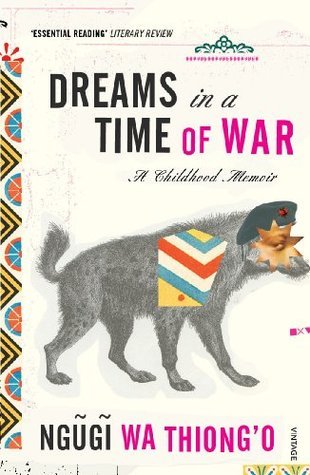What do you think?
Rate this book


Ngugi wa Thiong'o was born the fifth child of his father's third wife, in a family that includes twenty-four children born to four different mothers. He spent his 1930s childhood as the apple of his mother's eye, before attending school to slake what is considered a bizarre thirst for learning.
As he grows up, the wider political and social changes occurring in Kenya begin to impinge on the boy's life in both inspiring and frightening ways. Through the story of his grandparents and parents, and his brothers' involvement in the violent Mau Mau uprising, Ngugi deftly etches a tumultuous era, capturing the landscape, the people and their culture, and the social and political vicissitudes of life under colonialism and war.
273 pages, Kindle Edition
First published January 1, 2005
Even when not reading it, I can hear the music. The choice and arrangements of the words, the cadence, I can’t pick any one thing that makes it so beautiful and long-lived in my memory. I realize that even written words can carry the music I loved in stories, particularly the choric melody. And yet this is not a story; it is a descriptive statement. It does not carry an illustration. It is a picture in itself and yet more than a picture and a description. It is music. Written words can also sing.
Oh yes, such a day it was! The crop was in bloom, the entire field covered with pea flowers of different colors. I always remember the butterflies, so many; and I was not afraid of the bees that competed with the butterflies. He took out a bead necklace and said: Will you wear this for me? Well, I did not say yes or no, but I took it and wore it, she said with an audible sigh.
In the old school teachers told us about African kings like Shaka, Cetshwayo. They told us a bit about the white conquest and settlements in South African and Kenya. But now the emphasis was on white explorers like Livingstone, Stanley, Rebman and Krapf. We learned in positive terms about the establishment of Christian missions. We learned that white people had discovered Mount Kenya and many of our lakes, including Lake Victoria. In the old school, Kenya was a black man's country. In the new school, Kenya, like South Africa, was represented as having been sparsely populated before the whites arrived, and so whites occupied the uninhabited areas. Where, as in Tigoni in Limuru, they had taken African lands, the previous occupants had been compensated. There had also been tribal wars. White people brought medicine, progress, peace. The teachers were of course following the official government-approved syllabus under which students would eventually be examinedThis is what we are taught in British schools and through other cultural channels here too. In this memoir, we can see how these lies were at least partly rejected, or at least viewed critically, even by children like Ngugi. The schools also now punished students for speaking Gikuyu, using an insidious strategy; the first child to speak Gikuyu would be given a piece of metal, which would be passed to whoever was heard speaking it next. Whoever had it at the end of the day was beaten.
the African Inland Mission, which had already condemned the practice as barbaric and unchristian, went further in their campaign against the practice and announced that all their African teachers and agents would have to sign a declaration solemnly swearing never to circumcise female children; never to become a member of the Kikuyu Central Association, the leading African political organisation at the time; never to become a follower of Jomo Kenyatta, the KCA's general secretary... and never to join any party unless it was organized by the government or missionaries.Thus, female circumcision was aligned with anti-colonial political resistance. Reading this was the hugest A-HA moment for me; when white feminists shout out against the practice, regardless of ignorance or intent, we are echoing colonial oppressors attempting to crush decolonising struggle. Much care and nuance is needed...